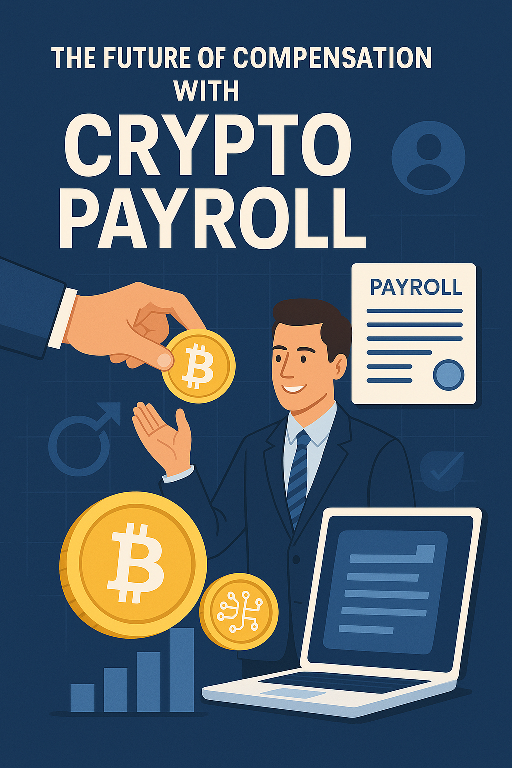The future of compensation with crypto payroll and salary tokens is taking shape in companies around the world. With more organizations embracing digital currencies for financial operations, payroll systems are now at the frontier of this financial revolution.
In the past, salaries were synonymous with checks, bank transfers, and structured fiat-based pay cycles. But as the digital economy matures, employees and employers alike are exploring alternatives. One such innovation is the distribution of wages using blockchain-based currencies and tokens, which presents a promising shift in how value is exchanged for labor.
From Paper to Protocol: A Brief History of Payroll
To understand how revolutionary salary tokens and blockchain-based compensation are, we need to reflect on the historical evolution of payroll. From early barter systems to gold-backed currencies, and eventually to fiat and electronic banking, the method of compensating work has always adapted to new economic realities.
The introduction of Bitcoin in 2009 opened a brand-new frontier in digital finance. While initially regarded as an experimental asset, it quickly inspired broader conversations about decentralization — and now, in the 2020s, it’s transforming the way people think about wages.
What is Crypto Payroll and Why Does It Matter?
Paying employees through digital assets such as Bitcoin, Ethereum, or stablecoins is an emerging compensation method reshaping how salaries are delivered. But it goes beyond simply transferring digital coins — it represents a broader financial philosophy centered on decentralization, transparency, and financial empowerment.
Companies that pay using blockchain technology can reduce friction, lower transaction fees, and speed up international salary distribution. This is particularly significant in global remote teams where traditional banking delays and exchange rates can be frustrating and expensive.
Moreover, crypto compensation enables immediate ownership and custody, bypassing intermediaries and empowering workers in economies with unstable currencies.
Salary Tokens: The Customization of Compensation
A salary token is a custom or standardized digital asset issued on a blockchain to represent an employee’s compensation. Unlike paying in Bitcoin or Ethereum, companies can create their own ERC-20 or BEP-20 tokens with features like vesting schedules, reward tiers, or internal exchange systems.
Salary tokens offer a high degree of programmability. For example, bonuses could be issued in non-transferable tokens that unlock after performance reviews or vesting periods. They can also be tied to the company’s internal economy, representing both pay and stake.
This leads to a hybrid approach to compensation: part cash, part crypto, part token — enabling a richer ecosystem of value exchange.
Benefits of Salary Tokens for Companies. Talent Attraction and Retention
In competitive sectors like blockchain development, tech startups, and gaming, offering compensation in innovative forms can be a major draw. It signals a modern, future-facing mindset that appeals to digitally native talent.
2. Global Payroll Simplification
Traditional international payroll involves multiple banks, delays, and high fees. Using blockchain, salaries can be paid instantly across borders with low cost — a game-changer for distributed teams.
3. Employee Ownership and Loyalty
Salary tokens can serve as alternatives or additions to traditional equity compensation. When employees receive a stake in a project via tokens, their incentives align with the company’s growth, encouraging long-term loyalty.
Employee Benefits and Considerations of Crypto Payroll
1. Financial Inclusion
Millions around the world remain unbanked but have access to smartphones and internet. Crypto-based payments provide them a direct channel for earning, storing, and using money.
2. Investment Opportunities
Receiving digital assets as compensation offers employees the potential for capital appreciation. Those paid in BTC or ETH over the last decade have seen substantial returns.
3. Risks and Volatility
Crypto is inherently volatile. Although digital assets can appreciate significantly, they also carry the risk of devaluation. That’s why many companies opt to use stablecoins or a hybrid of fiat and crypto to balance risk.
Regulatory and Tax Implications of Crypto Payroll
The biggest barrier to widespread adoption of crypto payroll and salary tokens is not technological — it’s legal. In many jurisdictions, tax agencies have yet to fully define how such compensation should be handled.
For instance, in the U.S., the IRS treats crypto as property, meaning employees must report fair market value at the time of receipt. In countries like Germany or Switzerland, tax rules may vary even further.
Companies adopting this model must work with legal and tax advisors to ensure compliance, issue appropriate documentation, and stay updated with evolving regulation.
Use Cases: Who’s Paying in Crypto?
Remote Tech Startups
Startups building in Web3 and blockchain naturally lean toward crypto-based compensation. These teams often hire globally and use salary tokens or stablecoins to reward employees quickly and efficiently.
DAOs (Decentralized Autonomous Organizations)
DAOs frequently issue governance or utility tokens as part of their compensation model. Members earn by contributing to the project, and in return, they receive tokens that grant both value and voting power.
Freelancers and Gig Workers
The gig economy is ripe for blockchain disruption. With smart contracts, freelancers can get paid instantly upon task completion. Platforms like Braintrust and Opolis are already paving the way for decentralized gig work.
Risks and Challenges of Crypto Payroll
While the promise is strong, there are challenges:
- Volatility: Without stablecoins or hedging strategies, paying in volatile tokens can lead to frustration or legal pushback.
- Tax Complexity: Employees and employers need to track and declare crypto income accurately.
- Regulatory Uncertainty: Laws are still being shaped, and early adopters may face changing rules.
- User Education: Not all employees are familiar with crypto wallets or key management.
Despite these issues, ongoing innovation in the space is addressing many of these concerns with tools that abstract complexity away from users.
Platforms Enabling the Crypto Payroll Revolution
Several startups and platforms have emerged to make crypto salary distribution easier:
- Bitwage: Offers crypto and fiat payroll solutions, allowing workers to receive part or all of their wages in digital currencies.
- Deel: Supports global crypto payouts to remote workers.
- Opolis: A member-owned employment DAO that helps independent workers get paid in crypto with added benefits.
- Gilded: A B2B platform for crypto accounting and payments, aimed at making digital finance manageable for organizations.
These platforms often integrate compliance tools, stablecoin options, and wallet solutions, reducing the barrier to entry for businesses.
The Road Ahead: What Will the Future Look Like?
As more companies embrace remote work, the global talent pool is no longer bounded by national borders. This shift demands more agile and inclusive financial tools — and crypto payroll is a natural fit.
In the next five to ten years, we could see:
- Widespread stablecoin payroll adoption, especially in hyperinflationary countries.
- Decentralized payroll protocols that integrate with DAO governance models.
- Salary token marketplaces, where employees can trade, stake, or redeem their compensation.
- Full compliance automation, making tax and reporting seamless.
Most importantly, we may witness a cultural shift — where employees have more choice, control, and clarity over how they are paid, and what their compensation means beyond fiat value.
How to Get Started with Crypto Payroll
For companies looking to test the waters:
- Educate your HR and finance teams about blockchain basics.
- Pilot a crypto salary program with volunteers or a small team.
- Use stablecoins to minimize volatility.
- Work with platforms that offer crypto payroll services with legal compliance features.
- Collect feedback, adapt, and expand gradually.
For employees:
- Learn how wallets work.
- Research the tax implications in your country.
- Advocate for choice — maybe part of your compensation could be in digital assets.
- Join communities exploring Web3 workspaces.
Final Thoughts: The Tokenized Workplace and Crypto Payroll
The future of compensation with crypto payroll and salary tokens isn’t just about technology — it’s about redefining value. What if work wasn’t just paid in cash, but in community, ownership, and upside?
In a decentralized world, compensation becomes more flexible, personalized, and empowering. While we’re still early, the seeds of this transformation are already being planted. The companies and workers who embrace it today may be the leaders of tomorrow’s global workforce.

















